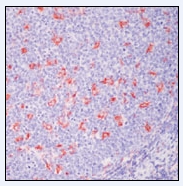CD68 Mouse Monoclonal Antibody [Clone ID: PG-M1]
Other products for "CD68"
Specifications
| Product Data | |
| Clone Name | PG-M1 |
| Applications | IHC |
| Recommended Dilution | Immunohistochemistry on Paraffin Embedded Sections: Use a 1/10-1/40 dilution in an ABC method. Incubation Time: 30 minutes at RT. Enzymatic predigestion with proteolytic enzymes is recommended for paraffin embedded tissue sections. PG-M1 is not recommended for Frozen Sections or cell smears. Positive Control: Tonsil |
| Reactivities | Human |
| Host | Mouse |
| Isotype | IgG3 |
| Clonality | Monoclonal |
| Immunogen | BALB/C mice were injected with Gaucher cells. |
| Specificity | Clone PG-M1 reacts with a glycoprotein of 110 kDa, expressed as intracytoplasmic molecule. It stains macrophages in a wide variety of tissues. Myeloid precursor cells and peripheral granulocytes are negative. The PG-M1 differs from EMB11 (CD68) because of its non-reactivity with granulocytes and their precursor cells. CD68 antibody Clone PG-M1 reacts strongly with a fixative-resistant epitope of an intracytoplasmic molecule, selectively expressed by virtually all macrophages of the human body. Although attempts to immunoprecipitate the molecule recognized by PG-M1 have failed so far, the reactivity of the antibody with COS-1 and WOP cells transfected with a human complementary DNA clone encoding for the CD68 antigen suggests that PG-M1 is a new member of the CD68 cluster. However, unlike other CD68 antibodies (KP1, EBM11, etc.), which react with both macrophages and myeloid cells, PG-M1 detects a fixative-resistant epitope on the macrophage-restricted form of the CD68 antigen. In 957 routinely fixed, paraffin-embedded samples, PG-M1 showed a more restricted reactivity with elements of the monocyte/macrophage lineage than the previously described monoclonal antibodies MAC-387 (anti- calgranulins), KP1 (CD68) and Ki-M1P. Among hematological malignancies, PG-M1 only labels acute leukemias of M4 and M5 type and rare examples of malignant histiocytosis/true histiocytic sarcoma. In contrast, acute leukemias of the M1, M2, M3, M6, M7, and L1-L3 types, non-Hodgkin's lymphomas, and Hodgkin and Reed-Sternberg cells of Hodgkin's disease are consistently PG-M1-negative. In the daily diagnostic practice, PG- M1 seems to be particularly valuable for the diagnosis of myelomonocytic or monocytic leukemia and neoplasms of true histiocytic origin in routine paraffin sections (see Ref. 4). Cellular Localization: Cell membrane. |
| Formulation | State: Supernatant State: Liquid Supernatant Preservative: Sodium Azide |
| Conjugation | Unconjugated |
| Storage | Store undiluted at 2-8°C for one month or (in aliquots) at -20°C for longer. Avoid repeated freezing and thawing. |
| Stability | Shelf life: one year from despatch. |
| Gene Name | CD68 molecule |
| Database Link | |
| Background | The CD68 antigen is a 37kD transmembrane protein that is post-translationally glycosylated to give a protein of 87-115kD. CD68 is specifically expressed by tissue macrophages, Langerhans cells and at low levels by dendritic cells. It could play a role in phagocytic activities of tissue macrophages, both in intracellular lysosomal metabolism and extracellular cell-cell and cell-pathogen interactions. It binds to tissue- and organ-specific lectins or selectins, allowing homing of macrophage subsets to particular sites. Rapid recirculation of CD68 from endosomes and lysosomes to the plasma membrane may allow macrophages to crawl over selectin bearing substrates or other cells. |
| Synonyms | Gp110, Macrosialin, Macrophage marker |
| Reference Data | |
Documents
| Product Manuals |
| FAQs |
| SDS |
{0} Product Review(s)
0 Product Review(s)
Submit review
Be the first one to submit a review
Product Citations
*Delivery time may vary from web posted schedule. Occasional delays may occur due to unforeseen
complexities in the preparation of your product. International customers may expect an additional 1-2 weeks
in shipping.






























































































































































































































































 Germany
Germany
 Japan
Japan
 United Kingdom
United Kingdom
 China
China



